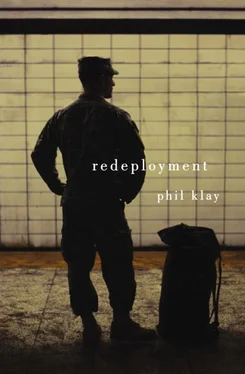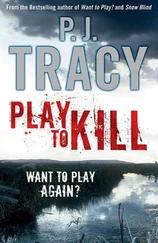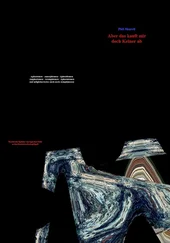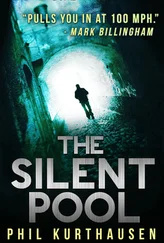Zara looked down and fiddled with her head scarf. “My father thinks Islam is the religion of poor blacks,” she said. “He says people will think I picked it up in prison.”
“Is that why you joined?” I said. “To piss off Daddy?”
She sighed and shook her head.
“So why?” I said.
“I’m learning why,” she said. “The practice of it teaches me.”
“And the clothes?” I said. “The whole…” I waved my hands at her.
She touched her head wrap. “It’s part of the commitment,” she said quietly. “What was it you said to the Special Assistant? Perception is reality?”
“Yeah.”
“Wearing this, people treat me like I’ve made a change in my life. Which I have.” She smiled. “That matters,” she said.
“In the military,” I said, “that’s part of why they give you the uniform.”
She nodded and we were quiet again. I could feel her slipping away. Her mind, perhaps, wandering off to other subjects. I knew I’d failed to communicate. Of course I had. I didn’t know what I wanted to tell her, just that I’d tell her anything to keep her listening.
Silence became awkward, then agonizing. She looked at me, her body relaxed but her eyes fixed on mine. Words, I thought, any words will do. If I were seducing her, I’d know what to say.
She broke the silence first. “You told the Special Assistant things turned ugly,” she said, “for you and your family, around 9/11. Is that true?”
“Yes,” I said, relieved we were talking. “If you saw my mother, you’d think she was white, but my dad’s different. He’s darker than me and he’s got that Arab dictator mustache thing going on. He looks exactly like Saddam Hussein.”
“Exactly?” she said. “Like he could be a body double?” She leaned in toward me. That simple movement, the physical expression of interest, excited me. “What I mean is, would you think that if your family still lived in Egypt?”
I laughed. “They look alike, especially with the mustache. And he won’t shave it. It’s a manhood thing.”
“And that caused problems,” she said.
“Some,” I said. “He’s so stubborn. And he became Mister Über-America. He had flags flying at our house, and ‘Support Our Troops’ magnets all over the bumper of his car. Not that that changed anything, the way he looked. Or the way we all looked, and with our Arab-sounding names, going through airport security.”
“I can imagine.”
“No, you can’t. Because when they’d pull him aside to pat him down by hand, he’d tell them, loud so everybody could hear, ‘I know you get a lot of flak, but I want you guys to know I support what you’re doing. You are protecting our American freedoms.’”
Zara shook her head sadly.
“And my mother, Jesus. She came from a totally different universe than my dad. Copt, yeah, but not the type to have family in Garbage City. Growing up, her friends were all Muslim, even one Jew, rich kids who read Fanon and talked radical politics before getting real and marrying each other. But my mom was more radical than all of them. More radical than my grandmom, even, who was a straight-up Communist before the June War. She married my dad. And then he pulled his American freedoms act? I thought she was gonna kill him the first time he did it. That shit nearly broke their marriage.”
“Why didn’t it?”
“She’s religious,” I said.
Zara smiled. “What did you think?”
“I was seventeen,” I said. “You’ve got to understand—my father was there when his cousin died. He was badly beaten himself. And then the people my father had told me were bad all my life had finally got my country really pissed. And those stories he’d told me weren’t bullshit anymore. My father, I mean, the man has never given two shits about me. He’s not a cuddly guy.”
“The Army was a way to make him proud?”
I winced. It didn’t sound so good coming from her mouth. “Make myself proud. But part of that would be in his eyes.”
“I imagine the Arab stuff got worse in the Army.”
“No,” I said. “Not at all. It was more direct, though.” I laughed. “One drill instructor, during inspection, he asked what I’d do if my brother joined al-Qaeda. Would I shoot him in the face? My own brother?”
“That’s awful.”
“I’m an only child,” I said. “I told him yes. Basic isn’t a place for subtleties.”
“What about the other recruits?”
“There was one guy, Travis. He had an uncle who worked construction, and after Travis joined the Army his uncle started refusing to work with this family of Muslim electricians. It was in Travis’ honor.”
“I’ve heard stories like that,” said Zara. “Actually, I’ve heard a lot worse.”
“Travis told it to me and then was like, ‘What you gonna do about it, faggot?’”
“What’d you do?”
“I told him I wasn’t Muslim. Or gay. It’s a nice card to have in your back pocket when you run into that stuff.”
“I don’t know if I could fight for an organization that treated me like that.”
“You’re thinking about it the wrong way,” I said. “That shit is just people. It wasn’t alienating. This”—I waved my hand toward the college—“this is alienating. All these special little children and their bright futures. Look, if Travis was the type to die for his buddies, and he might have been, I think he’d do it for me just as soon as for anyone else wearing Army cammies. That he hated me, and that I hated the ignorant fuck right back, well, there are circumstances that trump personal feelings.”
“The circumstances,” she said, “being a war. Where the Army was going to go kill all those people you’ve been mistaken for. And you get to watch.”
I rolled my eyes, though I was angrier than I let on. So I took the hookah and smoked for a while in silence. The benefit of hookah is that those moments aren’t dead space. You can blow smoke rings. You can perform and not say anything. You can think.
She didn’t seem to realize how this conversation was different from class, where we bullshitted over political theory. This mattered. And every time she contradicted me with her smug little assumptions about who I was and why I did what I’d done, it grated. It made me want to shut my mouth and hate her. Hate her for her ignorance when she was wrong, and hate her for her arrogance when she was right. But if you’re going to be understood, you have to keep talking. And that was the mission. Make her understand me.
“When I graduated from basic,” I said, “my father was prouder of me than he’d ever been. By this point, he was listening to Limbaugh and O’Reilly and Hannity nonstop, and my mother had a standing rule that he wasn’t allowed to talk politics in the house. Afghanistan, back then, felt like it’d been a complete success, and Bush was making the case for Iraq.”
Zara said, “I remember.” I put down the pipe and she picked it up.
“I’d been at Fort Benning,” I said, “getting the shit beat out of me. It’d been hot and awful and I’d been screamed at and PT’d half to death. I hadn’t seen my dad in months. But images of Saddam were everywhere. TV. Newspapers.” I took a breath. “And then there he was. The same face. The same build. He even walked with that cocky fucking strut. And there was that mustache.”
“So you saw him,” she said.
“And I saw Saddam.” I took a breath. “I mean, my dad, too. But everybody, my platoon, the DIs, they all knew what he looked like.”
Zara blew smoke. “You saw him through their eyes.”
“Through my own.”
“But how they saw him,” she said. “Maybe part of how they saw you, too?”
“I wonder if he knew,” I said. “We don’t really talk, but, I wonder. I mean, the man is an asshole. It’s just who he is. But I wonder if deep down, beyond the politics, if the mustache was a giant ‘fuck you.’ Maybe not to America, but to Americans, you know? All those God-fearing assholes who talk Jesus but don’t know that true Christianity is the Coptic Church.”
Читать дальше












